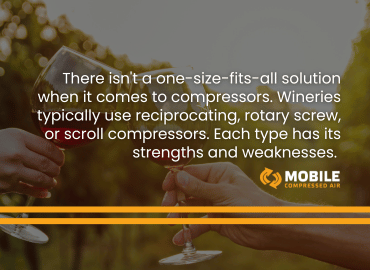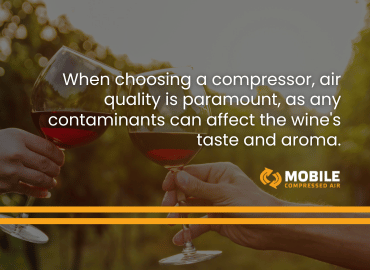Compressor Selection Guide for Wineries: Finding the Perfect Fit
Winemaking is an intricate craft where every step matters. From fermentation to bottling, maintaining ideal conditions is crucial for producing high-quality wines. Compressors are indispensable in various stages of winemaking, helping to maintain the quality, efficiency, and precision needed throughout the process. To help you choose the best compressor, we’ve put together this blog outlining factors you need to consider when selecting a compressor for your winery.
Compressed Air Applications in Wine Production
Compressors are versatile tools in winemaking, contributing to several processes crucial for producing high-quality wines.
Temperature Control and Climate Management: Controlling temperature is critical in winemaking. Compressors are integral in managing the temperature within fermentation tanks and storage facilities. They regulate the cooling systems, ensuring precise temperatures essential for fermentation, preventing spoilage, and preserving wine quality during storage.
Air Filtration and Aeration: Compressed air is utilised in wineries for aeration and filtration processes. During fermentation, introducing controlled amounts of oxygen is critical for yeast activity and flavour development. Compressed air is also used in filtration systems to remove impurities, ensuring clarity and purity in the final product.
Pressurisation and Pumping: Compressed air acts as a power source for pumps used in various winemaking stages. From transferring liquids between tanks to bottling, compressors provide the necessary pressure for pumps, enabling efficient and controlled movement of wine throughout the production line.
Pigging: Compressed air is often used to push a cleaning device through wine lines to limit wastage and prepare the line for the following batch.
Crushing: Compressed air is used in large proportions to fill a rubber bladder and place pressure on the fruit, squeezing the juice out.
Barrel Racking and Cleaning: Wineries use compressed air to clean and sanitise barrels. Pressurised air effectively removes residual liquids and sediments from barrels, preparing them for the next batch. This process ensures consistency in wine quality and prevents contamination.
Bottling and Packaging: Compressors play a crucial role in bottling lines by providing the necessary pressure for filling bottles with precision. From corking and sealing to labelling and packaging, compressors power various machinery in the bottling process, ensuring a smooth and efficient production line.
Nitrogen Generation: Wineries use compressors to produce nitrogen gas onsite. Nitrogen is valuable for wine preservation in processes such as blanketing tanks to prevent oxidation and maintain wine freshness. Nitrogen generators separate nitrogen from the compressed air feed providing a continuous flow of gas. See a free webinar on Nitrogen Generation in Winemaking.
Compressors have a wide range of applications in wine production. Understanding which processes are more critical for your winery will help you to assess the most appropriate compressor.
Understanding Compressor Requirements in Wineries
It’s essential to evaluate what your winery needs. Compressors come in various types and sizes, and each winery has unique demands. Assessing factors like the size of your operation, the production process, quantity of tanks, and the production volume will help determine the appropriate compressor capacity.
Types of Compressors Used in Wineries
There isn’t a one-size-fits-all solution when it comes to compressors. Wineries typically use reciprocating, rotary screw, or scroll compressors. Each type has its strengths and weaknesses. For instance, reciprocating compressors might be more affordable, while rotary screw compressors could offer higher efficiency. Understanding these differences is crucial in making an informed decision. Read Understanding the Types of Compressors in Wine Production for a Comprehensive Guide.
Factors Influencing Compressor Selection for Wineries
Several factors influence the choice of a compressor for wineries. Air quality is paramount, as any contaminants can affect the wine’s taste and aroma. Energy efficiency is another significant consideration, as it impacts operational costs. Noise levels, ease of maintenance, and the compressor’s ability to handle fluctuations in demand are also key factors to consider.
Selecting the Right Compressor for Different Winemaking Stages
Different stages of winemaking require different compressor capabilities. Fermentation, filtration, bottling, and storage each have different requirements. For instance, during fermentation, consistent airflow is essential, whereas in bottling, precise pressure control is critical. Understanding these needs will guide you towards the right compressor choice.
Maintenance and Service Considerations
Once a compressor is installed, proper maintenance is essential for longevity and efficiency. Regular servicing, checking for leaks, and cleaning filters are routine maintenance tasks. Ensuring your compressor is in top-notch condition will prevent breakdowns and maintain the quality of your wine production.
Final Thoughts
Selecting and installing the right compressor for your winery involves a thorough review of your operational requirements. Understanding your unique production needs, considering factors like air quality, energy efficiency, and choosing the right type of compressor for different stages of winemaking are vital steps.
If you need further help choosing the most suitable compressor for your winery, contact Mobile Compressed Air today.
Mobile Compressed Air is a compressor and nitrogen generation specialist based in Adelaide. With an extensive history in servicing the most prominent winery brands in South Australia, our tailored compressors and nitrogen generators are crafted to meet the specific demands of winemaking processes. Our longstanding commitment and specialised expertise make us the trusted choice for delivering reliable, industry-tailored compressed air solutions across diverse winery operations.



